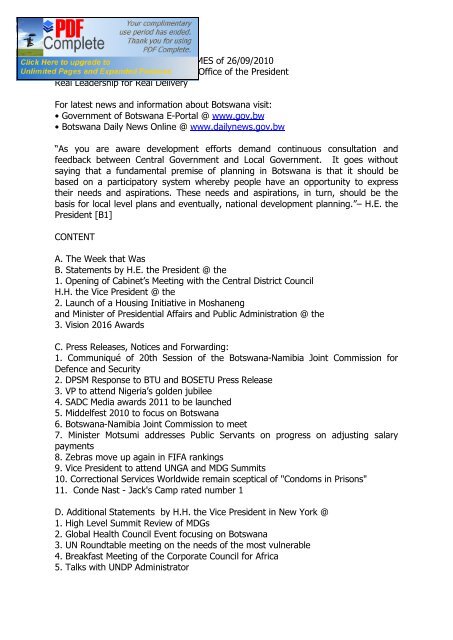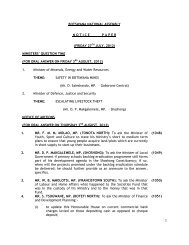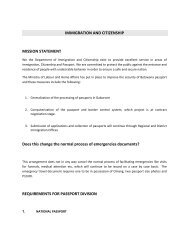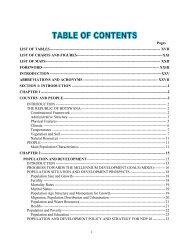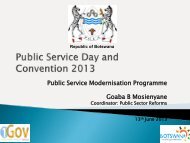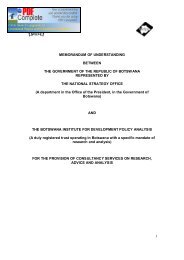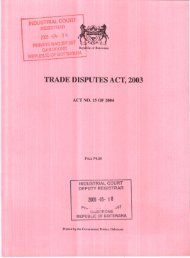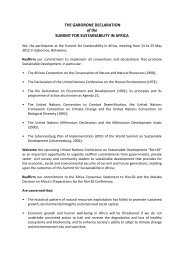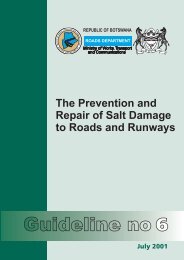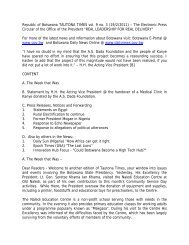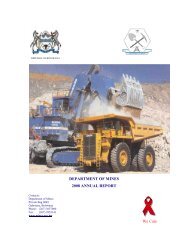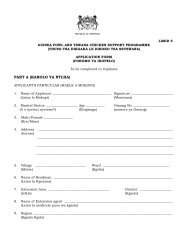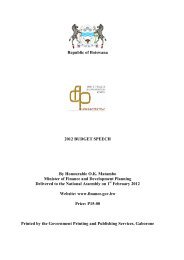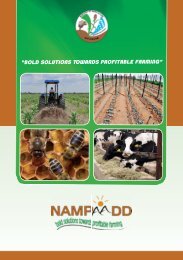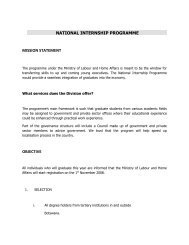Download Full Version - Government of Botswana
Download Full Version - Government of Botswana
Download Full Version - Government of Botswana
You also want an ePaper? Increase the reach of your titles
YUMPU automatically turns print PDFs into web optimized ePapers that Google loves.
Republic <strong>of</strong> <strong>Botswana</strong> TAUTONA TIMES <strong>of</strong> 26/09/2010<br />
The Electronic Press Circular <strong>of</strong> the Office <strong>of</strong> the President<br />
Real Leadership for Real Delivery<br />
For latest news and information about <strong>Botswana</strong> visit:<br />
• <strong>Government</strong> <strong>of</strong> <strong>Botswana</strong> E-Portal @ www.gov.bw<br />
• <strong>Botswana</strong> Daily News Online @ www.dailynews.gov.bw<br />
“As you are aware development efforts demand continuous consultation and<br />
feedback between Central <strong>Government</strong> and Local <strong>Government</strong>. It goes without<br />
saying that a fundamental premise <strong>of</strong> planning in <strong>Botswana</strong> is that it should be<br />
based on a participatory system whereby people have an opportunity to express<br />
their needs and aspirations. These needs and aspirations, in turn, should be the<br />
basis for local level plans and eventually, national development planning.”– H.E. the<br />
President [B1]<br />
CONTENT<br />
A. The Week that Was<br />
B. Statements by H.E. the President @ the<br />
1. Opening <strong>of</strong> Cabinet’s Meeting with the Central District Council<br />
H.H. the Vice President @ the<br />
2. Launch <strong>of</strong> a Housing Initiative in Moshaneng<br />
and Minister <strong>of</strong> Presidential Affairs and Public Administration @ the<br />
3. Vision 2016 Awards<br />
C. Press Releases, Notices and Forwarding:<br />
1. Communiqué <strong>of</strong> 20th Session <strong>of</strong> the <strong>Botswana</strong>-Namibia Joint Commission for<br />
Defence and Security<br />
2. DPSM Response to BTU and BOSETU Press Release<br />
3. VP to attend Nigeria’s golden jubilee<br />
4. SADC Media awards 2011 to be launched<br />
5. Middelfest 2010 to focus on <strong>Botswana</strong><br />
6. <strong>Botswana</strong>-Namibia Joint Commission to meet<br />
7. Minister Motsumi addresses Public Servants on progress on adjusting salary<br />
payments<br />
8. Zebras move up again in FIFA rankings<br />
9. Vice President to attend UNGA and MDG Summits<br />
10. Correctional Services Worldwide remain sceptical <strong>of</strong> "Condoms in Prisons"<br />
11. Conde Nast - Jack's Camp rated number 1<br />
D. Additional Statements by H.H. the Vice President in New York @<br />
1. High Level Summit Review <strong>of</strong> MDGs<br />
2. Global Health Council Event focusing on <strong>Botswana</strong><br />
3. UN Roundtable meeting on the needs <strong>of</strong> the most vulnerable<br />
4. Breakfast Meeting <strong>of</strong> the Corporate Council for Africa<br />
5. Talks with UNDP Administrator
E. Also in the News –<br />
1. Compass (Nigeria) "<strong>Botswana</strong>: Where lunatics get decent accommodation"<br />
A. The Week that Was<br />
Welcome to another edition <strong>of</strong> your weekly window into the Presidency, which<br />
comes on the eve <strong>of</strong> this year’s <strong>Botswana</strong> Day on Thursday (30/9/10), a date that<br />
will mark the 44th Anniversary <strong>of</strong> our country’s restored independence. Our next on<br />
the day edition will feature H.E. the President Lt. Gen. Seretse Khama Ian Khama’s<br />
<strong>Botswana</strong> Day Message as well as provide a special focus on this year’s Presidential<br />
Honours, which will be bestowed by His Excellency at a ceremony in Gaborone<br />
tomorrow afternoon (Monday 27/9/10) from 1400 hours [live BTV broadcast<br />
scheduled]. The President will, however, begin the day in Francistown, where from<br />
0800 hours he will address the opening session <strong>of</strong> this year’s bi-annual <strong>Botswana</strong><br />
Business Conference.<br />
On Tuesday (28/9/10) his Excellency will travel to Gachibana Village as the Guest <strong>of</strong><br />
Honour at the Grand opening <strong>of</strong> the Trans-Molopo (Bokspits-Tshabong) Road.<br />
As part <strong>of</strong> the build up to <strong>Botswana</strong> Day, last Friday night (24/9/10) the Minister <strong>of</strong><br />
Presidential Affairs and Public Administration, the Hon. Lesego Motsumi, <strong>of</strong>ficiated at<br />
this year’s Vision 2016 Awards [B3]<br />
The Week that Was<br />
The past week began as usual with civil servants on duty. This followed last week's<br />
confirmation by this Office that funds had been secured for the payment <strong>of</strong> salaries<br />
based on a 22 rather than 20 day month, as provided for by the new Public Service<br />
Act [C7].<br />
At a public meeting with <strong>Government</strong> workers at Sowa on Friday, to which the Press<br />
had been invited, the Hon. Minister <strong>of</strong> Presidential Affairs and Public Administration<br />
explained that because <strong>of</strong> the new provision’s financial implications, which had not<br />
originally been budgeted for, a process had to be followed to secure the necessary<br />
funds. Acknowledging that workers had been frustrated and confused by the delay,<br />
she further confirmed that she had earlier submitted a funding proposal to Cabinet,<br />
which was now being implemented. It is expected that the payments will start from<br />
October and be retroactively effective from May 1, 2010.<br />
H.E. the President’s Week<br />
H.E. the President’s week began with a series <strong>of</strong> briefings including a quarterly<br />
report back from the Ministry <strong>of</strong> Agriculture, which confirmed continued progress in<br />
both the arable and pastoral farming sectors.<br />
In the case <strong>of</strong> arable farming it was reported that since the introduction <strong>of</strong> ISPAAD<br />
there had been a notable increase in yields per hectare (ha) as well as the total<br />
number <strong>of</strong> hectares under cultivation. The output <strong>of</strong> cereals had thus increased from
1.0 tons/ha to 2.5tons/ha, tomatoes from 40 tons/ha to 70 tons/ha and cabbages<br />
from 40 tons/ha to 60 tons/ha.<br />
It was further reported that the Maun abattoir had re-started production on the 13th<br />
September following its temporary closure to correct deficiencies detected during its<br />
July trials. Repairs had also been completed at the Ostrich Abattoir.<br />
As part the taking Cabinet to the Councils initiative, the President and Ministers<br />
attended a full meeting <strong>of</strong> the Central District Council in Serowe on Tuesday [B1]. In<br />
opening remarks, His Excellency observed that delivering development requires<br />
continuous consultation between Central and Local <strong>Government</strong> underpinned by<br />
public accountability. He noted that citizens have a legitimate expectation to such<br />
basic services as drugs in their clinics, maintained roads and proper primary schools<br />
The President further highlighted issues <strong>of</strong> social safety and community<br />
empowerment, noting that <strong>Government</strong> is committed to the improvement <strong>of</strong> social<br />
protection through assistance programmes such as Ipelegeng and social welfare, as<br />
well as economic empowerment programmes like ISPAAD, YOUNG FARMERS FUND,<br />
and CEDA, in the context <strong>of</strong> <strong>Government</strong>’s commitment to eradicate absolute<br />
poverty, while building a prosperous and productive society. He concluded by<br />
expressing his concern that community participation in development is waning,<br />
leading to unsustainable reliance on <strong>Government</strong>.<br />
While six councillors decided to walk out, the vast majority <strong>of</strong> the opposition as well<br />
as ruling party councillors remained behind to engage with Cabinet on issues <strong>of</strong><br />
concern to their constituents.<br />
On Tuesday afternoon His Excellency received credentials from the incoming Liberian<br />
Ambassador, H.E. Lois Lewis Brutus. At the ceremony Ambassador Brutus observed<br />
that Liberia sees <strong>Botswana</strong> as a benchmark <strong>of</strong> good governance, more especially<br />
with respect to its leveraging <strong>of</strong> diamonds for development. Last year US Secretary<br />
<strong>of</strong> State Hillary Clinton had extensively cited <strong>Botswana</strong> as a model for Liberian<br />
recovery when addressing that country’s Parliament.<br />
On Thursday the President chaired a meeting <strong>of</strong> the Economic Committee <strong>of</strong><br />
Cabinet, which was focused on the progress being achieved by the Agriculture,<br />
Health and Diamond Hubs, as well as the challenges facing the Mmamabula project.<br />
The meeting was also reminded <strong>of</strong> the urgent need to re-energise implementation <strong>of</strong><br />
<strong>Botswana</strong> Excellence Strategy Action items in the context <strong>of</strong> evolving global<br />
economic environment. In this context it was reported that the National Strategy<br />
Office continues to consult with <strong>Government</strong> stakeholders to ensure more effective<br />
results based delivery.<br />
The President later also chaired a meeting <strong>of</strong> the Inter-sectoral Committee on the<br />
Campaign against Abuse <strong>of</strong> Alcohol, whose agenda included the National Alcohol<br />
Policy, Traditional Beer Regulations, and Review <strong>of</strong> the Alcohol Levy.
This afternoon His Excellency will visit the Kopong Library, which is one <strong>of</strong> 6 village<br />
libraries that have so far been donated to <strong>Botswana</strong> by the US based Rothchild<br />
Foundation.<br />
Vice President in New York<br />
H.H. the Vice President Lt. Gen. Mompati Merafhe left for New York last Saturday<br />
(18/9/10) to attend 65th Session <strong>of</strong> the United Nations (UN) General Assembly.<br />
On Monday His Honour addressed the Review Summit on the Millennium<br />
Development Goals (MDGs), where he informed delegates <strong>of</strong> <strong>Botswana</strong><br />
achievements and challenges, noting among other things that the percentage <strong>of</strong><br />
Batswana living below the poverty datum line had been reduced from 47% to 23%.<br />
He also noted that <strong>Botswana</strong> had achieved near universal access to primary<br />
education [D1].<br />
On Tuesday the Vice President hosted a seminar on “Integrated approach towards<br />
attainment <strong>of</strong> health related MDGs” [D2], while on Wednesday he addressed<br />
Roundtable sessions on the “Special needs <strong>of</strong> the most vulnerable” and “Maternal<br />
and Child Health and HIV/AIDS” [D3]. On Friday the Vice President addressed a<br />
breakfast meeting <strong>of</strong> the Corporate Council for Africa on investment opportunities in<br />
<strong>Botswana</strong> [D4] and met with the UNDP Administrator Ms. Helen Clark [D5]<br />
Also<br />
This author were surprised when a Mmegi newspaper this week reported that<br />
<strong>Government</strong> as a whole was unaware <strong>of</strong> the legal status <strong>of</strong> a court case affecting a<br />
supposed fresh appointee based on the fact that an individual, yours truly, had<br />
informed them (when contacted while out <strong>of</strong> the <strong>of</strong>fice late afternoon) that he was<br />
personally unaware <strong>of</strong> the case beyond what he had read in the Mmegi that very<br />
day. As it turns out Mmegi’s own account was dodgy at best, insinuating criminality<br />
in a civil dispute while reporting <strong>of</strong> a certain individual’s appointment to a position<br />
that does not exist. One can only once more bemoan the lack <strong>of</strong> pr<strong>of</strong>essionalism that<br />
allows certain elements <strong>of</strong> the private press to routinely publish false and potentially<br />
damaging information, while pretending that calling people late in the day <strong>of</strong> their<br />
deadlines is sufficient cover for their half baked accounts.<br />
- Dr. Jeff Ramsay, Deputy Permanent Secretary for Media (26/9/10)<br />
Contacts: Office Telephone: (267) 3975338 & Facsimile: (267) 3904019. Cell: (267)<br />
71318598. E-mail: jramsay@gov.bw<br />
B. STATEMENTS<br />
B1) 21/9/10: REMARKS BY HIS EXCELLENCY THE PRESIDENT LT. GEN. SERETSE<br />
KHAMA IAN KHAMA<br />
ON THE OCCASION OF CABINET’S MEETING WITH THE TO CENTRAL DISTRICT<br />
COUNCIL
[Salutations]<br />
1. Let me thank you Council Chairman, for welcoming us to the Central District<br />
Council Chamber this morning, and giving us the opportunity to interact with<br />
yourselves.<br />
2. As you may be aware this is the fifth meeting Cabinet has held with <strong>Full</strong> Council,<br />
the last one being with the Southern District Council two weeks ago.<br />
3. We are therefore here today to meet and interact with you as the leadership <strong>of</strong><br />
council and representatives <strong>of</strong> the people, and to hear from you and discuss issues<br />
impacting on service delivery in our attempts to serve Batswana.<br />
4. As I have noted before in previous engagements with your colleagues in other<br />
districts, it is my belief that at the end <strong>of</strong> such meetings, we will appreciate key<br />
delivery issues and challenges in the Central District, and hopefully collectively come<br />
up with proposals for improvement <strong>of</strong> service delivery. While the needs,<br />
requirements, aspirations and beliefs <strong>of</strong> our electorates may be the same across<br />
districts and constituencies, we note and appreciate that the challenges, the<br />
environment and resources available may differ from one district to another.<br />
5. Therefore how we deal with the issues, the challenges and your interventions will<br />
also differ depending on the people charged with that responsibility, their<br />
inclinations and their focus and perceptions <strong>of</strong> what can, may, or will not work.<br />
6. It is this diversity and richness <strong>of</strong> views that Cabinet and I hope to harness, to<br />
enrich and to turn into working strategies for improved quality <strong>of</strong> lives <strong>of</strong> our people.<br />
From time immemorial this nation has nurtured its democratic ideals through the<br />
process <strong>of</strong> consultation at the kgotla. This arrangement has served us well overtime<br />
through the promotion and building <strong>of</strong> consensus, ownership <strong>of</strong> decisions and<br />
involvement <strong>of</strong> everyone on issues that affect us as a nation.<br />
7. As you are aware development efforts demand continuous consultation and<br />
feedback between Central <strong>Government</strong> and Local <strong>Government</strong>.<br />
8. It goes without saying that a fundamental premise <strong>of</strong> planning in <strong>Botswana</strong> is that<br />
it should be based on a participatory system whereby people have an opportunity to<br />
express their needs and aspirations. These needs and aspirations, in turn, should be<br />
the basis for local level plans and eventually, national development planning.<br />
9. If this system is to be truly enhanced and nurtured, then a dialogue must be<br />
established between policy makers, development authorities, and communities. This<br />
is even more important during this period <strong>of</strong> recession where there are more<br />
demands than available financial resources to meet them.
10. For these reasons, as <strong>Government</strong> at different levels, we need to collectively<br />
engage ourselves to come up with interventions that will allow us to continue to<br />
deliver but within a compressed economy.<br />
11. In short my message to you is that let us be accountable. Accountability entails<br />
owning up to your responsibilities and appreciating you can still increase your level<br />
<strong>of</strong> performance. Citizens expect us to ensure they get their monthly rations, that<br />
clinics have the drugs, that roads are built and maintained, that primary schools are<br />
accessible and provide a conducive environment with the right material for learners<br />
and the poor and needy expect you to create jobs for them, and to ensure that<br />
where that is not possible they get their dues on time!<br />
12. Today I specifically want to talk to you about two critical issues which are <strong>of</strong><br />
great concern to my government. These are the issue <strong>of</strong> social safety and<br />
community empowerment and the issue <strong>of</strong> project implementation and<br />
management.<br />
13. My government is committed to the improvement <strong>of</strong> social protection through a<br />
number <strong>of</strong> government assistance programmes i.e., Ipelegeng, destitute, orphan<br />
and old age support, and assistance for starting up economic empowerment<br />
programmes like LIMID, ISPAAD, YOUNG FARMERS FUND, CEDA etc. These<br />
programmes are meant to cushion the not so well <strong>of</strong>f so that they don’t fall into<br />
poverty, and to assist those already in need to stand up and improve their livelihood.<br />
14. There are currently over 43000 registered destitutes country wide and over<br />
40000 <strong>of</strong> them receive cash allowances. These figures are by no means minor.<br />
Central District Council is supporting over 20000 orphans, destitutes and home<br />
based care patients.<br />
15. <strong>Government</strong> will continue to <strong>of</strong>fer support to the needy and vulnerable.<br />
However <strong>Government</strong> also looks up to you, and in fact your constituents expect you<br />
to ensure that these programs improve their livelihoods have a positive impact on<br />
their lives. I want to see projects coming alive, and people graduating from<br />
destitution as a result <strong>of</strong> proper support from you and better utilization <strong>of</strong><br />
<strong>Government</strong> support programmes.<br />
16. On project implementation, in spite <strong>of</strong> huge sums spent on project consultants<br />
and supervisors, we continue to receive reports <strong>of</strong> mammoth project delays; costing<br />
government millions <strong>of</strong> Pula which could have been utilized elsewhere to support a<br />
needy Motswana. Again I challenge you to diligently monitor these issues, for that is<br />
what Batswana expect you to do. There have been a number <strong>of</strong> projects in the<br />
Central District which have failed the final test, at great cost to government and the<br />
communities they were supposed to benefit.<br />
17. As you are all aware, due to the economic recession, <strong>Government</strong> has had to<br />
defer a number <strong>of</strong> development projects as our revenue could only support a limited<br />
number <strong>of</strong> ongoing development projects and recurrent activities. I appreciate that<br />
the Central District like elsewhere was equally affected. However I want to once
again challenge you to explore these challenges positively and to use the<br />
opportunity that this crisis presents to develop in partnership with both the private<br />
sector and other organizations, strategies to ensure developments in your District do<br />
not stall.<br />
18. Today’s economic situation dictates that <strong>Government</strong> as a whole, including the<br />
Local Authorities, should be prudent in financial management and also be proactive<br />
and creative in engaging their communities to assume greater responsibility for<br />
financing some activities in their localities.<br />
19. The other issue is whether you are doing enough to put in place economic<br />
strategies based on the appropriate policies for growing economic developmental<br />
activities in your district. As Local Authorities you must pay greater attention to<br />
stimulating the economic growth <strong>of</strong> your areas <strong>of</strong> jurisdiction. It is indeed my<br />
expectation that you would identify potential growth points and economic zones<br />
which you could market in collaboration with organizations such as CEDA and<br />
BEDIA.<br />
20. Some <strong>of</strong> you will also recall that over the years, we have put in place rural<br />
development policies that were aimed at revamping the economic and social<br />
development <strong>of</strong> our rural areas. The key focus was employment and poverty<br />
reduction. This is still a challenge across all districts. I need to point out that<br />
poverty eradication has been identified as one <strong>of</strong> the priority areas by my<br />
government and I expect all Councils to pursue strategies and initiatives aimed at<br />
eradicating poverty in their areas.<br />
21. I am also concerned that community participation and mobilization in<br />
development is waning. The spirit <strong>of</strong> self help which laid a solid foundation for<br />
nation building and mobilization for development at independence and thereafter<br />
has to be revived. I therefore call upon you to start community development and<br />
mobilization initiatives for capacity building and community empowerment. This is<br />
important, if we are to do away with the culture <strong>of</strong> entitlement and reduce<br />
dependence on <strong>Government</strong> handouts. Reliance on <strong>Government</strong> for everything is<br />
neither desirable nor sustainable.<br />
22. Let me also point out, Chairman, that as a Local Authority, Council is a major<br />
procuring entity in the district. You should therefore use your purchasing power to<br />
support Small, Medium and Micro Enterprises (SMMEs) to grow the local economy<br />
and create employment opportunities for the District. As Councils, you should make<br />
sure that procurement <strong>of</strong> basic commodities like bread, uniforms, etc. is done within<br />
localities or communities that produce them.<br />
23. Allow me at this point to applaud you for the efforts that you have made. I am<br />
informed that a number <strong>of</strong> development projects have been successfully completed.<br />
24. By way <strong>of</strong> conclusion let me state that Cabinet and I will continue to consult local<br />
authorities across districts with a view to jointly share development challenges, and<br />
implementation bottlenecks, together determine cost effective strategies to improve
governance, service delivery and to move together towards prosperity for all<br />
Batswana. I thank you for your attention.<br />
B2) 16/9/10: KEYNOTE ADDRESS BY HIS HONOUR THE VICE PRESIDENT LT. GEN.<br />
MOMPATI S. MERAFHE, MP. GUEST OF HONOUR LAUNCH OF AFFORDABLE<br />
HOUSING PROJECT IN MOSHANENG VILLAGE "PROVIDING HOMES FOR THE NEEDY<br />
BARCLAYS IN MOSHANENG"<br />
[Salutations]… Ladies and Gentlemen<br />
1. As we celebrate the Vision 2016 Awareness Month, it gives me great<br />
pleasure to join you this morning at this auspicious occasion marking the<br />
groundbreaking ceremony <strong>of</strong> destitute housing project in this beautiful village <strong>of</strong><br />
Moshaneng. This aptly captures one <strong>of</strong> the ideals <strong>of</strong> our National Vision <strong>of</strong> promoting<br />
a “Compassionate, Caring and Just Nation. Hardly two weeks ago, when I launched<br />
the Vision 2016 Awareness Month in Jackalas Number One, I appealed to the nation<br />
to continue promoting the spirit <strong>of</strong> volunteerism and selflessness in an effort to<br />
realise our National Vision. In this regard, it comes as a great relief to witness<br />
established companies such as Barclays Bank <strong>of</strong> <strong>Botswana</strong> responding to<br />
<strong>Government</strong>’s clarion call for support in a big way.<br />
2. The fact that Barclays Bank <strong>of</strong> <strong>Botswana</strong> has embarked on a P 1 million<br />
project, in partnership with Habitat for Humanity, geared towards providing homes<br />
for thirty (30) destitute families in Moshaneng deserves our commendation. This is a<br />
clear demonstration that the Bank is committed to improving the lives <strong>of</strong> the needy,<br />
mostly the disabled and the elderly, through the provision <strong>of</strong> decent housing. In<br />
essence, this is part <strong>of</strong> Barclays Responsibility Banking Strategy, which is designed to<br />
ensure that the Bank continues to invest in the communities in which it is operating,<br />
which is a source <strong>of</strong> inspiration to us.<br />
3. It is encouraging to note that the people <strong>of</strong> Moshaneng have resolved to<br />
join hands with the employees <strong>of</strong> Barclays Bank and provide physical labour required<br />
in this project, an example that other communities who have benefitted from similar<br />
initiatives should emulate. I am informed that the families, for whom Barclays will<br />
build houses, were selected with the assistance <strong>of</strong> the village leaders including the<br />
Kgosi, members <strong>of</strong> the Village Development Committee and the social worker for the<br />
area. The average size <strong>of</strong> each family is ten and mainly consists <strong>of</strong> one or two adults<br />
over the age <strong>of</strong> 65 – mainly grandmothers- and children.<br />
4. The project, which commenced in July <strong>of</strong> this year, is making great progress<br />
and 16 homes will be completed by the end <strong>of</strong> October and the remaining homes by<br />
the end <strong>of</strong> the year. I would like to reiterate that <strong>Government</strong> is committed to<br />
providing a conducive environment for companies and individuals, which have<br />
rededicated themselves to addressing numerous socio-economic challenges faced by<br />
our various communities.<br />
Bagaetsho,
5. I am pleased to note that many companies and individuals continue to show<br />
interest in this noble initiative <strong>of</strong> providing shelter for the less privileged members <strong>of</strong><br />
our community. It is for this reason, Distinguished ladies and gentlemen, that His<br />
Excellency, the President has recently appointed a team, chaired by Mr. Paul Paledi<br />
to coordinate the initiative <strong>of</strong> providing affordable housing to the needy. As you may<br />
be aware, <strong>Government</strong> has for the financial year 2010/2011 allocated P 8 million<br />
towards the construction <strong>of</strong> destitute houses in the Southern and Kweneng District.<br />
6. I hasten to add that this has not been an easy decision to make, as the rest <strong>of</strong><br />
the districts have their fair share <strong>of</strong> inhabitants without shelter over their heads.<br />
The major challenge that we face as <strong>Government</strong> is in fact the mobilisation <strong>of</strong> much<br />
needed financial and material resources to help the less privileged. To this end, I am<br />
humbled and truly delighted to launch this project, which will go a long way in<br />
addressing the issue <strong>of</strong> shelter for our needy communities.<br />
7. You will agree with me that the Self Help Housing Agency (SHHA) Programme<br />
that <strong>Government</strong> has been using to provide shelter for the less privileged in urban<br />
and semi urban localities is not enough. In essence, contribution to causes <strong>of</strong><br />
common good as demonstrated by Barclays and other “Good Samaritans” is highly<br />
appreciated. In this regard, I would like to appeal to companies and individuals to<br />
continue extending a helping hand to this programme, in order to secure a better life<br />
for future posterity.<br />
8. I must also encourage the beneficiaries to treasure this noble gesture by<br />
ensuring that these houses are properly maintained as symbols <strong>of</strong> hope and<br />
humanity. With these few remarks, I wish to declare the groundbreaking ceremony<br />
<strong>of</strong>ficially launched. I thank you. PULA!<br />
B3) 24/9/10: ADDRESS BY THE MINISTER OF PRESIDENTIAL AFFAIRS AND PUBLIC<br />
ADMINISTRATION HONOURABLE LESEGO. E. M0TSUMI, ON THE OCCASION OF THE<br />
VISION 2016 AWARDS GIVING CEREMONY<br />
{Salutations}...Ladies and gentlemen,<br />
Good evening,<br />
1. I am humbled to be part <strong>of</strong> this important ceremony to recognize deserving<br />
individuals and organizations that have excelled in their relentless pursuits <strong>of</strong> the<br />
Vision 2016 goals and aspirations.<br />
2. It is now common knowledge that through Vision 2016, this nation committed to<br />
achieve ‘Prosperity for all by the year 2016’. When we made this commitment in<br />
1996, Ladies and Gentlemen, we set ourselves milestones that we wanted to achieve<br />
knowing very well that the road to success was not going to be an easy one.<br />
3. We knew that in order to achieve our goals, we needed to change our mindsets<br />
and focus better than we did before. We knew that we needed to accelerate the<br />
pace at which we were doing things.
4. We also knew that if all the stakeholders played their part well by making critical<br />
inputs into the main channel <strong>of</strong> activities towards the achievement <strong>of</strong> prosperity for<br />
all by 2016, we were going to pull through and benefit from this process.<br />
5. I think it is fitting that we hold this Vision 2016 Excellence Awards ceremony<br />
because it provides us with the opportunity to, among others, reflect upon the<br />
significance <strong>of</strong> these awards and indeed the Vision itself.<br />
6. I must state that the Vision Council’s ability to organize an event <strong>of</strong> this<br />
magnitude demonstrates to me the fact that citizens and organizations have not only<br />
embraced our national Vision but have been able to locate their roles within the<br />
framework <strong>of</strong> the Vision, both as individuals and as organizations.<br />
7. Increased participation in these awards over the years truly demonstrates the<br />
willingness <strong>of</strong> citizens to play a meaningful role in the implementation <strong>of</strong> the Vision’s<br />
mandate and also the re-affirmation to commitment to the spirit <strong>of</strong> self-reliance.<br />
Bagaetsho let me hasten to indicate that all <strong>of</strong> us can contribute to this Vision in our<br />
own small ways. Ga go a tshwanna go nna le ope yo o ka nyatsang seabe sa gagwe<br />
mo Tebelopeleng e ya rona. I have always believed, and I still do, that this Vision is<br />
like a great river – we are all its tributaries. It needs us to fill it up, <strong>of</strong>fer it<br />
sustenance and keep it flowing for use by future generations.<br />
8. I recently had an opportunity to partake in the launch <strong>of</strong> Vision 2016 Awareness<br />
Month at Jackalas I where I learnt the village, under the tutelage <strong>of</strong> its own<br />
daughters and sons, was the first to develop a Strategic plan with a view to<br />
implementing Vision 2016.<br />
9. For a moment, Ladies and Gentlemen, I thought this was a true story <strong>of</strong> one <strong>of</strong><br />
the Vision’s tributaries playing its part? I am aware that some <strong>of</strong> our communities<br />
engage in projects geared towards the achievement <strong>of</strong> Vision 2016, and they have<br />
not necessarily drawn their strategic plans.<br />
10. As individuals and communities, we should always strive to develop action<br />
programmes to define our specific contribution to the nation’s efforts to realize the<br />
Vision’s goals and aspirations. As <strong>Government</strong>, we are fully supportive <strong>of</strong> this<br />
National Vision for it provides this nation a platform to discuss issues <strong>of</strong> mutual<br />
interest. It provides us an opportunity to introspect and find ways through which<br />
partners can help us to improve the lives <strong>of</strong> our citizens. I am hopeful that the<br />
efforts <strong>of</strong> the Vision Council to encourage the private sector and civil society to<br />
develop strategies for implementation <strong>of</strong> Vision 2016 will bear fruit.<br />
11. Admittedly, notable progress has been attained in some pillars, whilst for some<br />
we are still faced with insurmountable challenges to overcome. Lack <strong>of</strong> economic<br />
diversification, poverty, unemployment HIV/Aids are cited in the <strong>Botswana</strong><br />
Performance Report (2009) as some <strong>of</strong> the key challenges that we still have to<br />
contend with if we are to make serious inroads in achieving prosperity for all by<br />
2016. It is for partly for this reason that I have spent the past few weeks traversing<br />
the length and breadth <strong>of</strong> this country consulting with the various local authorities to
plead with them to embrace and take the lead role in promoting the Economic<br />
Diversification and Sustainable Growth Strategy in their areas.<br />
12. Directors <strong>of</strong> Ceremonies, this strategy outlines the milestones and major<br />
activities our government, in partnership with development partners, is committed to<br />
embark on if we are to diversify our economy.<br />
13. We have said it so many times that this economy cannot rely on diamonds<br />
alone, and the recent economic meltdown has demonstrated how vulnerable we are<br />
as a nation to rely on one major source <strong>of</strong> revenue. This strategy therefore, prepares<br />
us for the future so that we can remain globally competitive.<br />
14. It is imperative for us to look into other ways through which we can diversify our<br />
economy, and central to this is citizen participation in the whole process. Citizens<br />
must drive the whole process if we are to meet the goals <strong>of</strong> Vision 2016, and it<br />
becomes even easier if our communities develop strategies through which they can<br />
participate in this endeavour. The challenge is to continue to think outside the box if<br />
we are to serve this country well and ensure sustainable economic growth for the<br />
betterment <strong>of</strong> all.<br />
15. Tonight, Ladies and Gentlemen, we will witness individuals, <strong>Government</strong><br />
agencies, Parastatals and Non-<strong>Government</strong>al Organizations being given awards for<br />
various undertakings that are a result <strong>of</strong> improved productivity, commitment and<br />
compliance to Vision 2016. These individuals and organizations are demonstrating to<br />
us two things: first, that there is buy in and internalization on the expectations <strong>of</strong> the<br />
citizens in so far as Vision 2016 is concerned.<br />
16. Secondly, they are showing us that the theme for this year “turning challenges<br />
into opportunities” is really possible. With only 6 years left before we reach 2016, we<br />
have no choice but to leave no stone unturned in pursuit <strong>of</strong> Vision 2016 goals.<br />
Tonight, I want to say congratulations to all <strong>of</strong> you for a job well done and<br />
encourage you to continue to improve the marvellous work that you are doing. You<br />
make us proud.<br />
17. Truly, your tireless efforts and selfless dedication to serve this country are<br />
unparalleled. You have shown us that excellence is central to Vision 2016. And it is<br />
only through excellence that we can improve our lives and those <strong>of</strong> the communities<br />
that we serve as we drift towards the year 2016. I hope, even after receiving these<br />
awards, you will continue to be innovative in how you contribute to your societies.<br />
18. Ladies and Gentlemen, I believe these awards should inspire the rest <strong>of</strong> us to<br />
work harder and make even more progress towards the attainment <strong>of</strong> our goals.<br />
19. Whilst we award these deserving people, let us also remember that there are<br />
some individuals and organizations that are immensely contributing towards our<br />
communities through their social responsibility programmes.
20. Even though they are not taking part in this event, we want to wholeheartedly<br />
acknowledge their significant contribution. We are mindful <strong>of</strong> the fact that this<br />
country would not have progressed in the manner it has if it were not for their<br />
participation. We can only encourage them to be part <strong>of</strong> the process next year so<br />
that this country can appreciate your contributions towards the implementation <strong>of</strong><br />
Vision 2016.<br />
21. In conclusion, Director <strong>of</strong> Ceremonies let me thank you for having asked me to<br />
be with you in this joyous celebration, and urge all <strong>of</strong> you to follow the theme and<br />
make the noble goals <strong>of</strong> Vision 2016 a reality. In this way, you will be in course<br />
toward the implementation <strong>of</strong> our great Vision- Vision 2016.<br />
22. I thank you all and wish you a successful and enjoyable celebration as well as a<br />
happy independence holiday next week. I thank you. PULA.<br />
C. NOTICES & FORWARDING<br />
C1) 25/9/10: COMMUNIQUE OF 20TH SESSION OF THE BOTSWANA-NAMIBIA<br />
JOINT COMMISSION FOR DEFENCE AND SECURITY GABORONE, BOTSWANA 20TH<br />
– 24TH SEPTEMBER, 2010<br />
1. The 20th Session <strong>of</strong> the <strong>Botswana</strong>/Namibia Joint Commission for Defence and<br />
Security was held at Gaborone, <strong>Botswana</strong>, from the 20th – 24th September, 2010.<br />
2. The delegation <strong>of</strong> the Republic <strong>of</strong> <strong>Botswana</strong> was led by Hon. Lesego E. Motsumi,<br />
MP, Acting Minister <strong>of</strong> Defence, Justice and Security and included Hon. Peter L.<br />
Siele, MP, Minister <strong>of</strong> Labour and Home Affairs, and senior government <strong>of</strong>ficials.<br />
3. The delegation <strong>of</strong> the Republic <strong>of</strong> Namibia was led by Hon. Rosalia Nghidinwa,<br />
MP, Minister <strong>of</strong> Home Affairs and Immigration and included Hon. Lempy Lucas, MP,<br />
Deputy Minister <strong>of</strong> Defence, and senior government <strong>of</strong>ficials.<br />
4. The Commission reviewed the implementation <strong>of</strong> the resolutions <strong>of</strong> the last<br />
meeting which was held in Swakopmund, Namibia, from the 12th – 14th August,<br />
2009. In this regard, the Commission expressed satisfaction with the level <strong>of</strong><br />
cooperation between the two sister countries, especially in the areas <strong>of</strong> Defence,<br />
Safety and Security and agreed to nurture these cordial relations for continued<br />
peace and stability in the two countries.<br />
5. The Commission expressed satisfaction with the low levels <strong>of</strong> incidences <strong>of</strong> crossborder<br />
crimes such as stock theft and drug <strong>of</strong>fences during the period under review.<br />
The Commission, however, noted that the prevalence <strong>of</strong> transnational organised<br />
crimes, such as drugs and human trafficking, continue to pose a threat to both<br />
countries and the region. To this end, the Commission re-affirmed its continued<br />
commitment to combating these criminal activities.
6. The Commission commended the people and the <strong>Government</strong>s <strong>of</strong> the Republic <strong>of</strong><br />
<strong>Botswana</strong> and the Republic <strong>of</strong> Namibia for having held peaceful and democratic<br />
elections in 2009.<br />
7. The Commission expressed concern about the continued political crisis in<br />
Madagascar and the unstable political situations in Somalia, Sudan and the eastern<br />
part <strong>of</strong> the DRC. On Zimbabwe, the Commission noted progress made in the<br />
implementation <strong>of</strong> the Global Political Agreement and urged the parties to resolve<br />
outstanding matters <strong>of</strong> the Agreement.<br />
8. The Commission commended the Republic <strong>of</strong> Angola and the Republic <strong>of</strong> South<br />
Africa for successfully hosting the Africa Cup <strong>of</strong> Nations and 2010 FIFA World Cup<br />
Tournament respectively. The Commission noted with satisfaction the capacity <strong>of</strong><br />
African countries to host major events.<br />
9. The Namibian delegation extended an invitation to the <strong>Botswana</strong> delegation to<br />
attend the 21st Session <strong>of</strong> Namibia/ <strong>Botswana</strong> Joint Commission for Defence and<br />
Security, on a date and venue to be communicated.<br />
10. The <strong>Botswana</strong> delegation accepted the invitation to attend the 21st Session <strong>of</strong><br />
the Namibia/<strong>Botswana</strong> Joint Commission meeting to be held in the Republic <strong>of</strong><br />
Namibia next year on a date and venue to be decided.<br />
C2) 24/9/10: Response by the Director DPSM TO BOTSWANA TEACHERS UNION<br />
AND BOTSWANA SECONDARY SCHOOL TEACHERS UNION PRESS RELEASE TITLED<br />
“INTIMIDATION OF SCHOOL HEADS, DEPUTIES, HEADS OF HOUSES AND<br />
TEACHERS MUST STOP”<br />
Directorate <strong>of</strong> Public Service Management would like to respond to issues raised in<br />
the press release as follows:<br />
1) “It is unreasonable and unlawful to instruct teachers to do <strong>Botswana</strong> Examination<br />
Council work”<br />
The Ministry has issued a clear instruction to the Regional Directors vide E 1/6/11 III<br />
(30) dated 10 September, 2010 that teachers are under no obligation to invigilate<br />
examinations. However, those teachers willing to invigilate on their own volition are<br />
free to do so. It is our understanding that the Courts did not prohibit participation <strong>of</strong><br />
individual teachers in <strong>Botswana</strong> Examinations Council activities.<br />
2) “Don’t threaten poor Expatriates, Temporary and Probationary Teachers”<br />
We treat these as allegations and we would like BOSETU to come forward and prove<br />
these intimidations and threats.<br />
3) “School Heads have Rights to belong to Unions”
We are aware that teachers, like any other public employees have the right to<br />
belong to trade unions <strong>of</strong> their choices for purposes <strong>of</strong> Collective Bargaining, in<br />
accordance with Section 45 (1) <strong>of</strong> the Public Service Act, 2008.<br />
This right however, is not absolute as Section 45 (2) <strong>of</strong> the same Act imposes certain<br />
restrictions on trade union membership and provides as follows:<br />
“Notwithstanding any other provision <strong>of</strong> this Act, no member <strong>of</strong> management shall<br />
be represented by a negotiating body in respect <strong>of</strong> matters bearing upon relations<br />
between his/her employer and those employees there<strong>of</strong> or therein who are members<br />
<strong>of</strong> management unless the negotiating body represents only members <strong>of</strong><br />
management and no other employee”<br />
This means that a member <strong>of</strong> management, like a school head, can only belong to a<br />
union which represents members <strong>of</strong> management only. We will deal with the issue<br />
<strong>of</strong> who is a member <strong>of</strong> management in our response to (4) below.<br />
4) “School Heads are not managers”<br />
The Public Service Act, 2008 does not define who a member <strong>of</strong> management is.<br />
However, the Trade Unions and Employers Organisations Act at Section 48 (3)<br />
defines a member <strong>of</strong> management as:<br />
“An employee who has authority, on behalf <strong>of</strong> his employer, to employ, transfer,<br />
suspend, lay<strong>of</strong>f, recall, promote, terminate the employment <strong>of</strong>, reward, discipline or<br />
deal with the grievances relating to the employment <strong>of</strong> any fellow employees or<br />
effectively to recommend any such action or the manner in which such grievances<br />
ought to be dealt with, if the exercise by him <strong>of</strong> that authority is not merely <strong>of</strong> a<br />
routine or clerical nature but require the use <strong>of</strong> his discretion.”<br />
In our situation, School Heads perform one or part <strong>of</strong> the functions referred to<br />
above. They do not need to perform all <strong>of</strong> them in order to be regarded as<br />
managers.<br />
In addition, it is our considered position that in terms <strong>of</strong> the Education Act, School<br />
Heads and Heads <strong>of</strong> Departments are managers. Section 2 <strong>of</strong> the Act defines<br />
“manager” in relation to a school as a person or body <strong>of</strong> persons responsible for the<br />
management <strong>of</strong> the school. In terms <strong>of</strong> Regulation 46 <strong>of</strong> the Education Act<br />
(<strong>Government</strong> and Aided Secondary Schools Regulations), the Headmaster <strong>of</strong> a<br />
secondary school shall, among others functions:<br />
(a) be generally responsible for the development and good management <strong>of</strong> the<br />
school as an education institution, and, for the better discharge <strong>of</strong> those responsible,<br />
he shall have power to enforce the school rules by all reasonable means, and to<br />
exercise control and supervision over other members <strong>of</strong> the staff.<br />
(b) be responsible for the day to day administration <strong>of</strong> the school;
(c) Compile an annual report on the progress <strong>of</strong> the school at the end <strong>of</strong> each<br />
academic year and submit it to the Permanent Secretary.<br />
5) Recognition Agreements (BOSETU and BTU)<br />
We have also perused the relevant Clauses <strong>of</strong> our Recognition Agreements and in<br />
particular we would like to focus on the following, that define the scope <strong>of</strong> operation<br />
and/or recognition for the employer and the two teachers unions:<br />
(a) Clause 1.3 on Bargaining Unit – means teachers employed in a school, with the<br />
exclusion <strong>of</strong> employees to be agreed to by both parties from time to time.<br />
(b) Clause 1.11 on Management means management positions as defined in the<br />
Trade Unions and Employers Organisations Act <strong>of</strong> 1994 as amended from time to<br />
time and/or as may be required by context agreed by the parties.<br />
(c) Clause 4.2 on Freedom <strong>of</strong> Association provides that:<br />
“Notwithstanding Clause 4.1, employee who shall, by parties agreement be classified<br />
as management from time to time, shall be excluded from active participation in<br />
union activities.<br />
It is clear from the above quoted Clauses that the parties, being the employer on<br />
one hand and the respective teacher unions on the other, intended to have clear<br />
lines <strong>of</strong> operation indicating who should be a member <strong>of</strong> the union and that <strong>of</strong><br />
management.<br />
Although the parties did not specifically state and/or agree to who should be<br />
members <strong>of</strong> management, surely the intended exclusion if executed could not have<br />
overlooked the school heads and their deputies as they are the leaders <strong>of</strong> the<br />
institutions. The provisions <strong>of</strong> the law regarding meanings <strong>of</strong> “members <strong>of</strong><br />
management” and the “negotiating body” are also clear. Heads <strong>of</strong> schools and their<br />
deputies will surely fall within these categories and that is, if the parties were to<br />
make or agree on a cut-<strong>of</strong>f point.<br />
In consequences <strong>of</strong> the above, we maintain that school heads and their deputies are<br />
members <strong>of</strong> management for purposes <strong>of</strong> our operation and in accordance with<br />
applicable laws.<br />
6) “<strong>Botswana</strong> Education Council withdrew from the Talks”<br />
It is our considered view that <strong>Botswana</strong> Examination Council can enter into short<br />
term contracts with individual teachers to carry out <strong>Botswana</strong> Examination Council<br />
activities. We deem teachers to have the legal capacity to contract with institutions<br />
<strong>of</strong> their choice within the channels provided for in the Public Service Act.<br />
7) “Permanent Secretary in the Ministry <strong>of</strong> Education and Skills Development is<br />
Powerless”
The statement that Permanent Secretary has no authority since she has not been<br />
delegated in terms <strong>of</strong> Section 16 (1) is fallacious. The Director <strong>of</strong> Public Service<br />
Management through Directive No. 6 <strong>of</strong> 2010 delegated the functions that have<br />
hitherto been exercised by the Director <strong>of</strong> Teaching Service Management to<br />
Permanent Secretary, Ministry <strong>of</strong> Education. There is therefore nothing unlawful<br />
about the savingram referred to.<br />
C3) 24/9/10: VP to attend Nigeria’s golden jubilee<br />
The Vice President Lt. Gen. Mompati Merafhe is expected to attend Nigeria’s 50th<br />
independence anniversary in Abuja, Nigeria on Friday October 01, 2010. According<br />
to the High Commissioner <strong>of</strong> <strong>Botswana</strong> to Nigeria, Mr. Clifford Maribe, the Vice<br />
President will arrive in Abuja on Wednesday September 29, 2010. Ambassador<br />
Maribe says Vice President Merafhe is expected to pay a courtesy call on the<br />
President <strong>of</strong> the Federal Republic <strong>of</strong> Nigeria, Mr. Goodluck Jonathan on Thursday<br />
September 30, and attend the “Nigeria at Fifty” Presidential Banquet in Abuja in the<br />
evening. Vice President Merafhe will also attend “Nigeria at Fifty” Anniversary Parade<br />
at Eagle’s Square in Abuja on Friday October 01, 2010. The Vice President’s threeday<br />
Official Visit to Nigeria is expected to enhance economic and political<br />
cooperation between <strong>Botswana</strong> and Nigeria. Vice President Merafhe returns to<br />
Gaborone on Saturday October 02, 2010.<br />
C4) 22/7/10: SADC MEDIA AWARDS COMPETITION LAUNCH<br />
The SADC Secretariat Announces the Launch <strong>of</strong> the 2011 SADC Media Awards<br />
Competition. The Awards are in the fields <strong>of</strong> Print, Radio, Television and Photo<br />
Journalism. Prospective Entrants are invited to Submit Their Entries Accompanied by<br />
Pro<strong>of</strong> <strong>of</strong> their Nationality to the National Adjudication Committee (NAC) in their<br />
respective countries [<strong>Botswana</strong> Committee and contacts to be launched soon].<br />
Rules <strong>of</strong> the competition<br />
a) The entries should have been published/broadcast between January and<br />
December <strong>of</strong> the year preceding the awards (2010) by a registered and/or<br />
authorised media house or agency or carried on a website <strong>of</strong> a registered and/or<br />
authorised media house or agency in any <strong>of</strong> the SADC Member States;<br />
b) The themes <strong>of</strong> the entries to be submitted for the competition must be related to<br />
issues and activities promoting Regional Integration in the SADC Region:<br />
c) All media practitioners who are SADC nationals may enter the competition, except<br />
those in institutions contracted by SADC, SADC Secretariat staff and their immediate<br />
family members;<br />
d) All entries should be in one <strong>of</strong> the SADC working languages, i.e. English, French<br />
or Portuguese and should be submitted as they were published/broadcast<br />
(newspaper cuttings, websites, magazines, audio CDs or video cassettes/DVDs);
e) Entries are invited in the following categories:<br />
i. Print Journalism: comprising features/articles published in newspapers,<br />
newsletters, website; ii. Radio Journalism: comprising broadcast material; iii.<br />
Television Journalism: comprising televised material; iv. Photojournalism: comprising<br />
published picture(s) with a caption or text;<br />
➢ Print Journalism submissions should have a minimum <strong>of</strong> 600 (six hundred)<br />
words and a maximum <strong>of</strong> 2000 (two thousand) words.<br />
➢ Broadcast or televised materials should have a minimum duration <strong>of</strong> five minutes<br />
and a maximum duration <strong>of</strong> thirty minutes and all Broadcast material should be<br />
accompanied by a transcript in any <strong>of</strong> the three SADC languages.<br />
f) All entries must be submitted to the NAC not later than March 30, 2011;<br />
g) All submissions must contain full contact details <strong>of</strong> the media practitioner,<br />
including a passport-size photograph, physical address, telephone and, where<br />
applicable, postal address, fax number and e-mail address;<br />
Entries will be initially screened and judged by the NAC in each Member State which<br />
will select the best entry in each <strong>of</strong> the four categories to be forwarded to the<br />
Regional Adjudication Committee (RAC), through the SADC Secretariat not later than<br />
May 31, 2011. The SADC Secretariat shall not be responsible for any loss or damage<br />
to the work or material submitted.<br />
h) Selection <strong>of</strong> the best regional entries will be decided upon by the RAC;<br />
i) The RAC reserves the right not to award the prizes if the entries do not meet the<br />
competition requirements;<br />
j) The decision <strong>of</strong> the RAC shall be final;<br />
k) The winners will be announced and receive their prizes during the 31st SADC<br />
Summit <strong>of</strong> Heads <strong>of</strong> State and <strong>Government</strong>;<br />
l) Each category <strong>of</strong> the Awards, thus, Print, Radio, Television and Photo journalism<br />
carries a prize <strong>of</strong> US$2000.00.<br />
m) The monetary prizes will be accompanied by a certificate signed by the SADC<br />
Chairperson;<br />
n) The prizes will be paid directly to the winner. In case <strong>of</strong> a winner being unable<br />
to attend the ceremony, SADC will make arrangements to give the prize<br />
in his/her home country;
Further information and entry forms are obtainable from the National Adjudication<br />
Committees and SADC National Media Coordinators in each Member State.<br />
C5) 21/9/10: Middelfest International 2010 to feature <strong>Botswana</strong>.<br />
Below is a preliminary press release for the upcoming Middelfest International 2010<br />
Event, which is described as "a premiere cultural event with dance, music and food<br />
from many countries throughout the world.”<br />
Held annually in Middletown, Ohio, USA, Middelfest has celebrated a different<br />
country each year since 1981. This year’s event, which will take place during the first<br />
week <strong>of</strong> October, will have <strong>Botswana</strong> as its focus. As an event, Middlefest is reported<br />
to be quite, popular attracting visitors from throughout the mid-west and beyond.<br />
More information will be appearing on the event’s website - www.middfest.com<br />
Press Release: Middelfest International 2010 will focus on the southern African<br />
nation <strong>of</strong> <strong>Botswana</strong>.<br />
The celebration kicks <strong>of</strong>f with a 2:30 p.m., Sept. 26, <strong>Botswana</strong> Tea ‘n Talk and<br />
Exhibit opening in the lobby <strong>of</strong> the Middletown municipal building, 1 Donham Plaza.<br />
There will be African red bush –rooibos – tea served.<br />
Author Dr. Neil Parsons will speak at the opening. He is a colleague <strong>of</strong> Alexander<br />
McCall Smith, whose books, The No. 1 Ladies Detective Agency, have been part <strong>of</strong><br />
The Reading Challenge, which began last spring. The novels are set in <strong>Botswana</strong>.<br />
To mark <strong>Botswana</strong>’s Sept. 30 Independence Day, Miami University’s Middletown<br />
Campus will host A Taste <strong>of</strong> <strong>Botswana</strong> at 5 p.m., at the campus and community<br />
centre. Food includes samples <strong>of</strong> African stew, vegetable potjie and seswaaa with<br />
ugaili.<br />
It is free but tickets are required and can be obtained by calling (1) 513-727-3472.<br />
An ambassador lunch begins at 11:45 a.m., Oct. 1 at the Manchester Inn and<br />
Conference Centre. It will focus on business and commercial opportunities between<br />
<strong>Botswana</strong> and local or regional businesses. Tickets are $20 each or $140 for a table<br />
<strong>of</strong> eight. Reservations are due Sept. 29 and can be made by calling (1) 513-425-<br />
7707.<br />
Several exhibits featuring <strong>Botswana</strong>’s culture, art, literary, science, history and<br />
business will be on display in the city building Oct. 1-3. Hours are 6-10 p.m., Friday,<br />
10 a.m. to 10 p.m., Saturday, and noon to 6 p.m., Sunday. Admission is $5 per<br />
person and good all three days. Children 12 and under are admitted free.<br />
Information: www.middfest.com or (1) 513-425-7707
C6) 21/7/10: RE: 20th SESSION OF THE BOTSWANA/NAMIBIA JOINT PERMANENT<br />
COMMISSION ON DEFENCE AND SECURITY MEET AT FAIRGROUND HOLDINGS,<br />
GABORONE, BOTSWANA 20th-24th SEPTEMBER, 2010<br />
The 20th Session <strong>of</strong> the Namibia – <strong>Botswana</strong> Joint Commission for Defence and<br />
Security commenced yesterday at <strong>of</strong>ficials level at Fairground Holdings. The<br />
Commission will meet at Ministerial level on Thursday.<br />
The Joint Commission meeting is held on a rotational basis. During the meeting the<br />
Commission will review Defence and Security issues which are <strong>of</strong> mutual interest to<br />
the two countries. The Commission will also review progress on issues agreed upon<br />
at the 19th Session held in Namibia in 2009. The Commission will further use the<br />
opportunity to exchange information on a wide range <strong>of</strong> issues.<br />
The primary objective <strong>of</strong> the Commission is to contribute to a safe and secure<br />
environment for socio-economic development and the maintenance <strong>of</strong> the excellent<br />
relations which exist between two countries.<br />
The <strong>Botswana</strong> delegation to the meeting will be led by Honourable Lesego E.<br />
Motsumi-MP, Acting Minister <strong>of</strong> Defence, Justice and Security, and will also include<br />
Honorable Letlhogonolo P. Siele-MP, Minister <strong>of</strong> Labour and Home Affairs, H.E<br />
Gobopang D. Lefhoko-<strong>Botswana</strong> High Commissioner to Namibia and Senior<br />
<strong>Government</strong> Officials.<br />
The Namibia delegation will be led by Honourable Rosalia Nghdinwa-MP, Minister <strong>of</strong><br />
Home Affairs and Immigration and includes Honourable Lempy Lucas-MP, Deputy<br />
Minister <strong>of</strong> Defence, H.E Hadino Hishongwa, Namibia’s High Commissioner to<br />
<strong>Botswana</strong> and Senior <strong>Government</strong> Officials<br />
Members <strong>of</strong> the press are once more availed with a draft programme for the<br />
Thursday in which sessions that will be open to press coverage are indicated in red.<br />
C7) 17/7/10: Minister Motsumi addresses Public Servants in Sowa; Notes progress<br />
on adjusting salary payments<br />
The Minister <strong>of</strong> Presidential Affairs and Public Administration, the Hon. Lesego<br />
Motsumi, met with civil servants in Sowa this afternoon as part <strong>of</strong> her ongoing<br />
outreach to <strong>Government</strong> Workers on the implications <strong>of</strong> the new Public Service Act<br />
(Public Service Act No. 30 <strong>of</strong> 2008), which came into effect in May.<br />
During the meeting Minister Motsumi acknowledged that she was aware <strong>of</strong> enquiries<br />
and concerns regarding a provision in the Act with respect to payment <strong>of</strong> salaries<br />
based on a 22 day month, rather than the previous 20 days, following the Act's<br />
commencement.<br />
She explained that because <strong>of</strong> the new provisions financial implication, which had<br />
not originally been budgeted for, a process had to be followed in order to secure the<br />
funds to pay according to the revised formula.
She further noted that she had recently submitted a proposal to Cabinet that had<br />
been accepted and which is now being worked on.<br />
She further observed that it was now anticipated that the payments will start from<br />
October, and be retroactively effective from May 1, 2010.<br />
C8) 17/7/10: Zebras move up again in FIFA rankings<br />
The latest FIFA national team rankings were released this week, with <strong>Botswana</strong> once<br />
more moving up in the context <strong>of</strong> the Zebras impressive AFCON 2012 Qualifier<br />
campaign. In the latest rankings <strong>Botswana</strong> moved up 11 places to 82 positions. This<br />
follow a 23 place surge for the team in July which put them in the global top<br />
hundred.<br />
The Zebras current position is the highest in the nation's football history. But<br />
<strong>Botswana</strong> still has a way to go if it is to join the African top ten, which this week<br />
were announced as follows (team global rankings bracketed)<br />
1 Egypt (8)<br />
2 Ghana (20)<br />
3 Cote d’Ivoire (23)<br />
4 Gabon (31)<br />
5 Nigeria (34)<br />
6 Algeria (35)<br />
7 Cameroon (37)<br />
8 Burkina Faso (39)<br />
9 Tunisia (56)<br />
10 South Africa (58)<br />
Overall African teams have made great strides in the latest FIFA rankings, a fact that<br />
is attributed in part to the world football controlling body's decision that teams from<br />
the continent will now get the same number <strong>of</strong> points for a win as those on other<br />
continents.<br />
In the past, African teams earned far inferior points for a win against a fellow African<br />
opponent than their European counterparts. The only time that African teams earned<br />
superior points was if they recorded wins against Europeans during tournaments like<br />
the FIFA Confederation Cup or the FIFA World Cup. But Supersport reports that two<br />
months ago FIFA took a decision that African teams will now earn the same amount<br />
<strong>of</strong> points for a win against any opponent and it is beginning to show dividends.<br />
<strong>Botswana</strong>'s advance is not surprising given that the Zebras have within a relatively<br />
short period <strong>of</strong> time grounded the former African champions the Carthaginian Eagles<br />
<strong>of</strong> Tunisia in Tunis, as well as humbled the once fancied Sparrow Hawks <strong>of</strong> Togo.<br />
C9) 15/9/10: H.H. the Vice President to attend United Nations General Assembly
The Vice President Lt. Gen. Mompati Merafhe leaves for New York, United States <strong>of</strong><br />
America on Saturday September 18, 2010 for the 65th Session <strong>of</strong> the United Nations<br />
(UN) General Assembly. Vice President Merafhe will on September 27 address the<br />
United Nations General Assembly on <strong>Botswana</strong>’s position on various issues <strong>of</strong> global<br />
interest. Prior to that, the Vice President will on September 20, 2010 address the<br />
Review Summit on the Millennium Development Goals (MDGs) and inform on the<br />
country’s achievements and challenges. He is also expected to host breakfast<br />
seminar on “Integrated approach towards attainment <strong>of</strong> health related MDGs” on<br />
September 21, 2010. Still at the UN, Vice President Merafhe will address a<br />
Roundtable sessions on the “”Special needs <strong>of</strong> the most vulnerable” and “Maternal<br />
and Child Health and HIV/AIDS”, on September 22, 2010. The Vice President will be<br />
accompanied by the Minister <strong>of</strong> Foreign Affairs and International Cooperation, Hon.<br />
Phandu Skelemani, Member <strong>of</strong> Parliament for Gaborone South, Hon. Kagiso<br />
Molatlhegi and senior government <strong>of</strong>ficials.<br />
Meanwhile, Vice President Merafhe will also attend Nigeria’s 50th independence<br />
anniversary celebrations in Abuja on October 01, 2010. Vice President Merafhe<br />
returns to Gaborone on October 02, 2010.<br />
C10) 15/9/10: Correctional Services Worldwide remain sceptical <strong>of</strong> "Condoms in<br />
Prisons"<br />
In recent years condoms have been promoted by some stakeholders here and<br />
elsewhere as an antidote HIV-transmission among prison populations. The best<br />
evidence from around the world, however, suggests that the issue in not so simple.<br />
At a Corrections Health Services Conference held in Australia back in 1997, Dr.<br />
Hernan Reyes <strong>of</strong> the International Committee <strong>of</strong> the Red Cross (ICRC) presented a<br />
global perspective on the issue, which concluded that:<br />
"The issue <strong>of</strong> condoms for prisoners concerns only the tip <strong>of</strong> the very ugly iceberg <strong>of</strong><br />
sexual violence in prisons. Sexual transmission <strong>of</strong> HIV infection (and other STDs for<br />
that matter) will not be eliminated by making condoms available."<br />
In the years since the above finding the circumstance <strong>of</strong> HIV transmission within<br />
prisons and corresponding arguments for and against condom distribution within<br />
correctional facilities have not changed very much.<br />
Where condoms have been widely introduced into prison systems, such as in the UK<br />
and Netherlands, the outcomes have been debatable and certainly not convincing to<br />
the global community.<br />
In the USA as <strong>of</strong> April 2010 only ten correctional systems (out <strong>of</strong> several thousand at<br />
state and local level) were reported to allow for the distribution <strong>of</strong> condoms in their<br />
facilities, despite the existence <strong>of</strong> many pilot programmes and studies dating back to<br />
the 1980s.<br />
While the issue <strong>of</strong> condoms in prisons in many African and Islamic countries in<br />
particular has been associated with deep seeded opposition to homosexual
ehaviour, in those countries where so-called “Gay rights” are legally and socially<br />
accepted the focus <strong>of</strong> debate has rather been on the efficacy <strong>of</strong> condoms in the<br />
context <strong>of</strong> the harsh reality <strong>of</strong> sodomy practices among actual prison populations. To<br />
put it bluntly anal sex:<br />
• Is generally considered to be risky behaviour by medical pr<strong>of</strong>essionals, even in<br />
consensual heterosexual as well as homosexual contexts;<br />
• Anal sex in prison populations is more <strong>of</strong>ten coercive and as such places its<br />
participants at far greater risk;<br />
• The efficacy <strong>of</strong> using condoms to reduce risk in the context <strong>of</strong> anal sex is not the<br />
same as for vaginal sex (which is why there exists elsewhere in the world so-called<br />
“gay condoms”); and<br />
• The efficacy <strong>of</strong> using condoms in prison settings to reduce the health risks<br />
associated with anal sex is generally considered to be much more problematic than<br />
would be the case in non-prison settings.<br />
Further to the above, it is the law in many if not most jurisdictions around the world;<br />
including those which otherwise take a more liberal view towards homosexuality,<br />
that sexual relations between prisoners, more especially male inmates, is forbidden.<br />
While it is globally recognized that sexual encounters between prisoners frequently<br />
do occur, such incidents are more <strong>of</strong>ten than not viewed as a challenge to both the<br />
authority <strong>of</strong> correctional <strong>of</strong>ficers and the well being <strong>of</strong> the incarcerated under their<br />
supervision.<br />
Many correctional institutions, including ones rated as being rehabilitative facility<br />
benchmarks, thus remain adverse to sending conflicting messages by allowing for<br />
the distribution condoms, while at the same time undertaking disciplinary<br />
interventions aimed at reducing if not eliminating the scourge <strong>of</strong> forcible sodomy<br />
among their wards.<br />
Debate on the issue <strong>of</strong> condoms in prisons is <strong>of</strong> course not one sided. There<br />
continues to exist widely differing views among health pr<strong>of</strong>essionals and other<br />
informed stakeholders.<br />
What remains clear is that the distribution <strong>of</strong> condoms is seen as much less <strong>of</strong> a<br />
priority among those administrators and experts who are most actively engaged in<br />
correctional institution issues, than those who place condoms and/or homosexual<br />
rights at the centre <strong>of</strong> their HIV advocacy efforts.<br />
An example from what might be considered to be a more “progressive” critique <strong>of</strong><br />
persistent calls for prison condom distribution is contained in an influential 2006<br />
American study “Condoms in Prison: The Ethical Dilemma” by Pr<strong>of</strong>essor Robert E.<br />
<strong>Full</strong>ilove (Associate Dean for Community and Minority Affairs at Columbia University's<br />
Mailman School <strong>of</strong> Public Health), who observed that:<br />
“Should condom distribution be the primary tool <strong>of</strong> prevention? I would argue it<br />
need not be. We already know that significant numbers <strong>of</strong> sexually active men are
not skilled at using condoms effectively. Thus, providing condoms without the HIV<br />
education—including a broad range <strong>of</strong> topics and risk factors such as unsafe<br />
tattooing practices—means that we are not doing our utmost to assure that the<br />
distribution results in satisfactory condom use. Further, there is evidence that in<br />
many facilities, condom distribution would cause problems for the inmates who<br />
requested them.<br />
“Sex behind bars may be prevalent in most prisons, but sex between inmates is<br />
illegal in almost every state. Thus, requesting a condom might be considered<br />
probable cause for investigating whether or not an inmate is engaged in illegal<br />
activity. Ex-prisoners have insisted, in informal conversations with me, that accepting<br />
a condom might result in reprisals by prison <strong>of</strong>ficials who are not always fair in their<br />
treatment <strong>of</strong> the incarcerated population. Accepting a condom, in other words, might<br />
cause greater harm than good in some facilities. Finally, if our prisons are a reservoir<br />
for HIV infection and AIDS, then appropriate and aggressive medical interventions<br />
are probably a more urgent ethical imperative than distributing condoms.”<br />
Pr<strong>of</strong>. <strong>Full</strong>ilove’s study thus concluded that:<br />
"Distribution <strong>of</strong> condoms is not the primary ethical obligation we confront as we<br />
consider strategies to reduce the burden <strong>of</strong> high HIV/AIDS rates in jails and prisons.<br />
The time when such a strategy might have worked has passed."<br />
C11) 13/9/10: Conde Nast - Jack's Camp rated number 1 resort in Africa/Middle East<br />
The 2010 winners <strong>of</strong> the Annual Conde Nast traveller’s survey have been<br />
announced. In the accommodation section for international leisure hotels, Jack's<br />
Camp in the Makgadikgadi, <strong>Botswana</strong> has been voted the favourite hotel in the<br />
Middle East, Africa & the Indian Ocean islands category.<br />
According to Conde Nast the resort was propelled to first position with an overall<br />
score <strong>of</strong> 94.87, obtaining higher scores for environmental friendliness,<br />
ambience/decor, and its Kalahari location.<br />
The close runner-up in the category was the Four Seasons resort at Landaa<br />
Giraavaru in the Maldives, with a composite score 94.27, followed by Denis Island<br />
resort in the Seychelles, with a score <strong>of</strong> 93.51<br />
D. SPECIAL FOCUS H.H. THE VICE PRESIDENT IN NEW YORK - ADDITIONAL<br />
STATEMENTS -<br />
D1) 20/9/10: STATEMENT BY HIS HONOUR LT. GENERAL MOMPATI S. MERAFHE,<br />
MP., THE VICE PRESIDENT OF THE REPUBLIC OF BOTSWANA, AT THE HIGH LEVEL<br />
PLENARY ON THE MDGS<br />
Mr. President, Mr. Secretary General, Your Excellencies Heads <strong>of</strong> State and<br />
<strong>Government</strong>, Distinguished Delegates, Ladies and Gentlemen.
Mr. President,<br />
1. Allow me to congratulate you on your election to the Presidency <strong>of</strong> the 65th<br />
Session <strong>of</strong> the United Nations General Assembly.<br />
2. Let me also seize this opportunity to thank your predecessor, His Excellency, Dr.<br />
Ali Treki, for his leadership <strong>of</strong> the 64th Session <strong>of</strong> this Assembly.<br />
3. I wish to also commend the Secretary General, under whose stewardship, we<br />
have been able to convene for this crucial Summit.<br />
4. Five years ago, we convened here in New York to review progress made on the<br />
Millennium Development Goals, since their adoption in 2000.<br />
5. This review showed that the enthusiasm and commitment displayed by world<br />
leaders at the 2000 Millennium Development Goals Summit did not translate into our<br />
desired results.<br />
6. It is evident that many developing countries are lagging behind on most <strong>of</strong> the<br />
targets.<br />
7. In this regard, we should renew our pledge and do everything possible to take our<br />
people out <strong>of</strong> the dehumanizing conditions <strong>of</strong> abject poverty and deprivation in line<br />
with the Millennium Development Goals.<br />
8. This notwithstanding, I have no doubt in my mind that we all remain committed<br />
to the course <strong>of</strong> the Millennium Declaration.<br />
9. In the case <strong>of</strong> <strong>Botswana</strong>, we believe in the spirit and thrust <strong>of</strong> the Declaration,<br />
that as a government, we should endeavour to eradicate poverty.<br />
10. My President has laid before the nation a road map towards prosperity for all;<br />
the roadmap that is underpinned by a quest for human development and dignity.<br />
11. We believe that through this roadmap, <strong>Botswana</strong> can achieve more in terms <strong>of</strong><br />
improving the livelihoods <strong>of</strong> its citizens.<br />
12. Our commitment to the Millennium Development Goals has been amplified in our<br />
current National Development Plan, which runs from 2010 to 2016; a year just after<br />
the target date <strong>of</strong> the MDGs.<br />
13. <strong>Botswana</strong> has made some progress towards eradicating extreme poverty as<br />
evidenced by the declining percentage <strong>of</strong> people living below the poverty datum line.<br />
14. The percentage <strong>of</strong> people living below the poverty datum line declined from 47%<br />
in 1993 to an estimated 23% in 2009.<br />
15. We firmly believe, as a <strong>Government</strong>, that there is no tolerable level <strong>of</strong> poverty.
16. To this end, different categories <strong>of</strong> vulnerable groups such as old age<br />
pensioners, destitute persons, orphans and vulnerable children as well as home<br />
based care patients, have access to food, education, subsistence allowance and<br />
other basic necessities <strong>of</strong> life.<br />
17. However, realizing that the fight against poverty should be sustained, <strong>Botswana</strong><br />
has adopted a flagship programme on poverty eradication, which focuses on<br />
promoting broad-based growth for sectors that create opportunities for sustainable<br />
livelihoods.<br />
18. The programme is geared at enhancing human capabilities <strong>of</strong> the poor through<br />
investing in, and strengthening institutions that promote poor people’s participation<br />
in the growth process.<br />
19. <strong>Botswana</strong> continues to commit significant resources to literacy and skills<br />
development <strong>of</strong> her citizens.<br />
20. Consequently we have achieved universal primary education, where more than<br />
95% <strong>of</strong> the 7 to 13 year olds had enrolled in primary education by 2007.<br />
21. My <strong>Government</strong> has also made notable progress in the provision <strong>of</strong> health care<br />
for Batswana.<br />
22. For instance, the proportion <strong>of</strong> mothers who are attended to by a trained health<br />
pr<strong>of</strong>essional during delivery has remained above 90% since 1998.<br />
23. In addition, the country continues to make significant inroads in the fight against<br />
HIV and AIDS pandemic.<br />
24. Similarly, 62.7% <strong>of</strong> people living with HIV and eligible for Anti – Retroviral<br />
Therapy were on treatment in 2005, but today more than 90% are on antiretroviral<br />
drugs.<br />
25. In 2001, an estimated 40% <strong>of</strong> infants born to HIV positive mothers were<br />
infected with the virus and this proportion has declined to just 3%.<br />
26. Notwithstanding the progress I have just alluded to, we continue to face<br />
challenges with respect to maternal and infant mortality.<br />
27. Water is a scarce commodity in <strong>Botswana</strong>.<br />
28. However, my <strong>Government</strong> has been able to provide potable water to more than<br />
95% <strong>of</strong> the population since the year 2000.<br />
29. In addition, more than 80% <strong>of</strong> our people have access to improved sanitation<br />
facilities.
30. One <strong>of</strong> the greatest challenges to humanity is climate change.<br />
31. The impact <strong>of</strong> climate change is already being felt around the globe as witnessed<br />
by the never ending natural calamities bedevilling many parts <strong>of</strong> the world.<br />
32. It goes without saying, therefore, that if not adequately and expeditiously<br />
addressed, it will continue to impede development efforts, increase risk to public<br />
health, frustrate poverty eradication interventions and reverse gains made towards<br />
achieving the Millennium Development Goals.<br />
33. In this connection, as part <strong>of</strong> the response, <strong>Botswana</strong> has established a National<br />
Climate Change Committee, whose mandate is to oversee national policies on<br />
climate change and the implementation <strong>of</strong> the United Nations Framework<br />
Convention on Climate Change activities.<br />
34. At the 2000 World Summit, we pledged to “Strengthen the United Nations with a<br />
view to enhancing its authority and efficiency, as well as its capacity to address<br />
effectively the full range <strong>of</strong> challenges <strong>of</strong> our time”.<br />
35. Let us thus make this possible by providing this organisation with the necessary<br />
support for it to respond to our development challenges in a timely and focused<br />
manner.<br />
36. It is for this reason, Mr. President that we would like to commend the United<br />
Nations Secretary-General for establishing the Millennium Development Goals<br />
Advocacy Group <strong>of</strong> eminent personalities who will support him in building political<br />
will and mobilizing global action to make the MDGs Summit a turning point in the<br />
collective effort to achieve the Goals by 2015.<br />
37. I believe that more emphasis should be given towards supporting groups <strong>of</strong><br />
countries with special needs such as Middle Income Countries (MIC), Landlocked<br />
Developing Countries (LLDCs) and Small Island Developing States (SIDS).<br />
38. On their own, these groups <strong>of</strong> countries do not possess enough capacity and<br />
resources to mitigate disasters and development challenges.<br />
39. In conclusion, Mr President, my Delegation looks forward to the adoption <strong>of</strong> an<br />
action oriented outcome at the end <strong>of</strong> this High Level Plenary Meeting which I<br />
believe will be adequately resourced. I thank you for the courtesy <strong>of</strong> your kind<br />
attention.<br />
D2) 21/9/10: STATEMENT BY HIS HONOUR LT. GEN. MOMPATI S. MERAFHE, MP.<br />
VICE PRESIDENT OF THE REPUBLIC OF BOTSWANA DURING A SIDE EVENT<br />
ORGANISED JOINTLY BY BOTSREP AND THE GLOBAL HEALTH COUNCIL<br />
“BOTSWANA’S EXPERIENCE WITH INTEGRATED APPROACH IN ATTAINMENT<br />
HEALTH RELATED MDGS”
Your Excellency the Former President <strong>of</strong> <strong>Botswana</strong> Mr Festus Mogae, Honourable<br />
Minister Erik Solheim, Minster <strong>of</strong> Environment and International Development <strong>of</strong><br />
Norway, Honourable Ministers here present, Dr Jeffery Sturrchio, President and CEO,<br />
Global Health Council, Your Excellencies Heads <strong>of</strong> the International Organisations<br />
here present, Distinguished guests,<br />
1. I wish to thank you for honouring our invitation to this occasion to share and<br />
exchange views on “<strong>Botswana</strong>’s experience in pursuing an integrated approach<br />
towards the attainment <strong>of</strong> health related Millennium Development Goals”. This<br />
meeting affords me the opportunity to express my country’s debt <strong>of</strong> gratitude to all<br />
our cooperating partners, including the United Nations system, without whose<br />
contribution, we could not have succeeded in addressing the scourge <strong>of</strong> HIV and<br />
AIDS. Let me take this opportunity to recognise the Global Health Council for<br />
partnering with us in this important event.<br />
2. I must also pay special tribute to Norway for her support that has enabled us to<br />
achieve significant health milestones. Indeed, Norway’s continued support in the<br />
training <strong>of</strong> our much needed medical personnel, especially doctors, goes a long way<br />
in advancing our development goals.<br />
3. As you may be aware, <strong>Botswana</strong> attaches great importance to partnerships and<br />
international cooperation. It is through these valuable collaborations that we have<br />
been able to mount a credible fight against HIV and AIDS and to strengthen our<br />
health care system.<br />
4. Ninety percent (90%) <strong>of</strong> our healthcare services are delivered by government<br />
through a network <strong>of</strong> hospitals, clinics, health posts and mobile posts. On average,<br />
ninety – five percent (95%) <strong>of</strong> <strong>Botswana</strong>’s population is within an 8km radius <strong>of</strong> a<br />
health facility.<br />
5. At the beginning <strong>of</strong> the fight against HIV and AIDS, our programs were purely<br />
vertical. However, in the recent past we started integrating them into the rest <strong>of</strong> the<br />
National Health Service. For example, to date we <strong>of</strong>fer HIV and contraceptive<br />
services at the same facility and by the same health care worker, which increases<br />
patients’ access to these services. This is a more cost effective and a convenient way<br />
<strong>of</strong> providing health care services to more people.<br />
6. We are also integrating Tuberculosis and HIV programs. Tuberculosis (TB)<br />
afflicts two-thirds <strong>of</strong> people living with HIV and AIDS. As a result, it is cost effective<br />
for these patients to be taken care <strong>of</strong> under an integrated program. Furthermore,<br />
malaria prevention has been integrated in maternal and child health services,<br />
whereby anti-malaria interventions are <strong>of</strong>fered together with routine ante natal and<br />
child health services, such as immunisations, child health days and many others.<br />
7. We have also made significant progress in integrating Prevention <strong>of</strong> Mother to<br />
Child transmission programme into routine Ante Natal Care. This programme has<br />
had a positive impact on our Safe Motherhood Programmes. The integration <strong>of</strong> our<br />
programs has led to the improvement in our health care system and health
outcomes in <strong>Botswana</strong>. This is <strong>of</strong> critical importance because, as you may be aware,<br />
<strong>Botswana</strong> has one <strong>of</strong> the highest HIV prevalence rates globally with a national<br />
prevalence <strong>of</strong> 17.6%, and adult prevalence and incidence <strong>of</strong> 25% and 1.5%<br />
respectively.<br />
8. Ever since the country was confronted with the HIV and AIDS epidemic in the<br />
late 1980’s, the <strong>Government</strong> <strong>of</strong> <strong>Botswana</strong> has successfully led in creating an<br />
enabling environment for the fight against the disease. In essence, our national Anti<br />
Retroviral (ARV) programme has ensured that more Batswana can now lead longer<br />
and healthier lives. HIV and AIDS, therefore, has been rendered a chronic disease<br />
and this underscores the need to integrate its management into other programmes<br />
for improved access and sustainability.<br />
9. Let me conclude my remarks, by reiterating that the desire to close gaps and<br />
improve access and sustainability to achieve the objectives <strong>of</strong> the health related<br />
MDGs by 2015 needs our individual and collective efforts. I thank you for the<br />
courtesy <strong>of</strong> your attention and look forward to a fruitful discussion.<br />
D3) 24/9/10: REMARKS BY HON. KAGISO MOLATLHEGI, MP FOR GABORONE<br />
SOUTH ON BEHALF OF THE VICE PRESIDENT OF THE REPUBLIC OF BOTSWANA AT<br />
THE 65TH HIGH LEVEL PLENARY ON THE MDGS AT A ROUND TABLE DISCUSSION<br />
“ADDRESSING THE SPECIAL NEEDS OF THE MOST VULNERABLE”<br />
New York, 22nd September 2010<br />
Honourable Co – Chairs <strong>of</strong> this Roundtable, Honourable Ministers, Dear Roundtable<br />
Participants,<br />
1. It gives me great pleasure to have an opportunity to make my intervention on the<br />
subject; “Addressing the special needs <strong>of</strong> the most vulnerable”. There is no shadow<br />
<strong>of</strong> doubt that the subject is a pertinent one to many countries <strong>of</strong> the world.<br />
2. In the case <strong>of</strong> <strong>Botswana</strong>, we are troubled by the fact that, in spite <strong>of</strong> the small<br />
population <strong>of</strong> only 1.8 million people, there is a notable segment which is still<br />
classified as ‘vulnerable’. The vulnerable groups in <strong>Botswana</strong> include destitute<br />
persons, orphaned children, women, people with disabilities, resource poor farmers<br />
and the elderly. These groups face unique challenges which have necessitated<br />
government to put in place robust social protection programmes geared towards<br />
ensuring that they continue to lead dignified lives.<br />
3. My government firmly believes that for the country to achieve the Millennium<br />
Development Goals, the plight <strong>of</strong> the vulnerable people must be vigorously<br />
addressed. <strong>Botswana</strong> has in place a programme <strong>of</strong> support to destitute persons. The<br />
programme is geared towards improving the living conditions <strong>of</strong> the very poor<br />
households in terms <strong>of</strong> providing adequate nutrition and health. Specific<br />
interventions under this programme include; provision <strong>of</strong> food basket and cash on a<br />
monthly basis.
4. Under this programme, children <strong>of</strong> destitute persons are also supported with<br />
school uniforms, personal allowances and toiletry at school. In addition, government<br />
implements the Public Works Programme which targets the unemployed poor. The<br />
programme aims at providing temporary employment and relief income to the skilled<br />
and semi-skilled labour.<br />
5. My government also recognizes children as another vulnerable group, especially<br />
those who are orphaned. To this end, the <strong>Government</strong> has put in place an orphan<br />
care programme to provide care and support for those children who have lost their<br />
parents. The children are cared for until their eighteenth birthday when they are<br />
now presumed to be <strong>of</strong> age to take care <strong>of</strong> themselves.<br />
6. Another vulnerable group is the resource poor subsistence farmers. <strong>Government</strong><br />
has put in place programmes aimed at enhancing productivity in the agricultural<br />
sector, such as the Livestock Management and Infrastructure Development scheme<br />
(LIMID). The package includes provision <strong>of</strong> small stock and chicken rearing. These<br />
initiatives and many others have contributed substantially to ensuring that poverty<br />
levels in the country are arrested. I thank you.<br />
D4) 24/9/10: REMARKS BY HIS HONOUR LT. GENERAL MOMPATI S. MERAFHE, MP.<br />
VICE PRESIDENT OF THE REPUBLIC OF BOTSWANA ON THE OCCASION OF THE<br />
BUSINESS BREAKFAST HOSTED BY THE CORPORATE COUNCIL ON AFRICA<br />
Mr. Stephen Hayes, President <strong>of</strong> the Corporate Council on Africa; Mr. Jacob Nkate,<br />
Chief Executive Officer <strong>of</strong> the <strong>Botswana</strong> Export Development and Import Authority<br />
(BEDIA); Members <strong>of</strong> the Business Community; Ladies and Gentleman;<br />
1. I would like to thank you for your warm words <strong>of</strong> welcome. Let me take this<br />
opportunity to express my sincere appreciation to the Corporate Council on Africa,<br />
for hosting this important interactive meeting.<br />
2. Mr. President, I am aware that many, if not most, <strong>of</strong> you around the table, are<br />
familiar with the evolution <strong>of</strong> my country <strong>Botswana</strong>, from its humble beginnings as a<br />
Least Developed Country at Independence in 1966, to its present classification as an<br />
upper middle income country. This formal categorisation has however, not<br />
immunised <strong>Botswana</strong> against the daunting development challenges facing other<br />
developing countries.<br />
3. In the case <strong>of</strong> <strong>Botswana</strong>, these include inadequate diversification <strong>of</strong> our economy,<br />
unfavourable climatic conditions that undermine the country’s agricultural potential,<br />
and the HIV and AIDS pandemic. The financial and economic crisis, which has<br />
impacted <strong>Botswana</strong> negatively like many other countries around the world, merely<br />
exacerbated my county’s challenges. The need to tackle these and other challenges,<br />
and set the country on a path to sustainable development, have prompted my<br />
<strong>Government</strong> to embark on a deliberate and focused economic diversification<br />
program, mainly through foreign direct investment.
4. This is why I am meeting with you today; to invite you to <strong>Botswana</strong> to explore<br />
with us, the prospects <strong>of</strong> setting up businesses in the country, which will no doubt<br />
broaden your business portfolios. For us, your business activity in <strong>Botswana</strong> would<br />
contribute to our efforts towards economic diversification and growth, employment<br />
creation, income generation, poverty eradication, technology and skills transfer, and<br />
so forth. We are seeking a partnership with you, and we see it as a win – win<br />
relationship.<br />
5. Mr. President, I think the question in your mind is, why <strong>Botswana</strong>. Over the years,<br />
my <strong>Government</strong> has put in place, what we consider an attractive package for<br />
investors. This incentive package includes:<br />
- the lowest tax regime in the region <strong>of</strong> 15% for manufacturing and services<br />
companies;<br />
- a negotiable tax holiday <strong>of</strong> 5 to 10 years for high impact and strategic businesses;<br />
- free repatriation <strong>of</strong> pr<strong>of</strong>its, dividends and capital and<br />
- a 200% refund on the cost <strong>of</strong> training at an accredited institution.<br />
6. In addition to these, we expect that the investor would benefit from the general<br />
business-friendly environment consisting <strong>of</strong>, among others:<br />
- a stable and predictable political and economic set up;<br />
- a consistently high credit rating internationally;<br />
- a firmly entrenched culture <strong>of</strong> the rule <strong>of</strong> law;<br />
- a high literacy rate <strong>of</strong> over 82%;<br />
- a competitive labour cost <strong>of</strong> USD150 per month for unskilled workers;<br />
- respect for the sanctity <strong>of</strong> contracts;<br />
- a sizeable regional market <strong>of</strong> 300 million people;<br />
- a large duty free, quota free market in Europe and the United States <strong>of</strong> America.<br />
7. Mr. President, <strong>Botswana</strong> is inviting American investors to explore investment<br />
opportunities in areas <strong>of</strong> great potential such as:<br />
- Textile and clothing manufacturing;<br />
- Leather products manufacturing;<br />
- Glass – making;<br />
- Mineral prospecting and mining;<br />
- Mineral beneficiation that includes diamond polishing, cutting and jewellery<br />
making;<br />
- Development <strong>of</strong> sectoral economic growth points, otherwise known in <strong>Botswana</strong> as<br />
Hubs, to enhance the country’s competitiveness and benefit in certain activities.<br />
- These growth points have been identified in areas such as Innovation, Diamond<br />
beneficiation, Transport, Health, Education and Agriculture.<br />
8. Let me conclude my brief remarks by once again thanking the Corporate Council<br />
on Africa, through you Mr President, for having made this interaction possible. As I<br />
indicated earlier, I have with me here, as part <strong>of</strong> my delegation, Mr. Nkate, the Chief
Executive <strong>of</strong> BEDIA, who will be able to amplify on some <strong>of</strong> the issues, I have raised<br />
during our discussion, as necessary. I thank you.<br />
D5) 25/9/10: OPENING REMARKS BY HIS HONOUR VICE PRESIDENT OF THE<br />
REPUBLIC OF BOTSWANA LT. GENERAL MOMPATI S. MERAFHE DURING HIS<br />
MEETING WITH UNDP ADMINISTRATOR MS. HELEN CLARK<br />
1. Let me thank you Your Excellency for affording me this opportunity to interact<br />
with you.<br />
2. I must hasten to commend you for your sound leadership during successful<br />
organisation <strong>of</strong> the Millennium Development Goals High Level Plenary.<br />
3. The UNDP has supported <strong>Botswana</strong>’s development efforts over the years and this<br />
support continues to this day. <strong>Botswana</strong> therefore welcomes the “Delivering – As –<br />
One” initiative, and we are therefore optimistic that it will result in improved<br />
coordination and delivery <strong>of</strong> the UNDP Programme.<br />
4. <strong>Botswana</strong>, like the rest <strong>of</strong> the world, has not been spared <strong>of</strong> the adverse effects <strong>of</strong><br />
the global economic meltdown. For two consecutive years we have operated a<br />
budget deficit; P 13 b in 2009/2010 and P12 b in 2010/2011. In spite <strong>of</strong> this budget<br />
deficit, government took a deliberate decision not to decrease its spending,<br />
particularly in the development budget.This was done for the sole reason that<br />
government is a major player in the country’s economy, and its spending was<br />
necessary to stimulate the economy.<br />
5. HIV and AIDS continue to be a concern for <strong>Botswana</strong>. However, the country<br />
continues to make significant inroads in fighting the pandemic. This is demonstrated<br />
by the fact that over 90% <strong>of</strong> people living with HIV and eligible for Anti – Retroviral<br />
Therapy are on treatment. In addition, the proportion <strong>of</strong> infants born to HIV positive<br />
mothers who are infected with the virus has declined over the years from above<br />
40% in 2001 to just 3%.<br />
6. My government is also troubled by the number <strong>of</strong> who live in poverty. We have as<br />
a result come up with a flagship programme <strong>of</strong> poverty eradication which is aimed at<br />
eliminating poverty from those members <strong>of</strong> our society who find themselves in such<br />
a condition.<br />
7. Let me conclude by assuring the UNDP, through you, <strong>of</strong> <strong>Botswana</strong> governments’<br />
commitment and support in your endeavours. I thank you.<br />
E. ALSO IN THE NEWS:<br />
NB: News reports, statements and/or views reproduced below are NOT necessarily<br />
those <strong>of</strong> <strong>Government</strong> <strong>of</strong> <strong>Botswana</strong>.<br />
E1) 17/9/10: From the Compass Newspaper Nigeria - "<strong>Botswana</strong>: Where lunatics get<br />
decent accommodation" By BIODUN AKOMOLAFE
In Gaborone, even animals obey rules...<br />
ASK an average Nigerian where Gaborone is located in Africa, not many would tell<br />
you they had ever heard about the capital city <strong>of</strong> <strong>Botswana</strong>.<br />
But that country boasts <strong>of</strong> the fastest growing economy in Africa and the second<br />
highest Gross Domestic Product (GDP) in the world.<br />
<strong>Botswana</strong> has a population <strong>of</strong> less than two million people and covers a geographical<br />
area <strong>of</strong> 581,730 square kilometres comparable to the size <strong>of</strong> France.<br />
Gaborone boasts <strong>of</strong> approximately 250,000 persons <strong>of</strong> the entire <strong>Botswana</strong>'s<br />
1,850,000 population.<br />
Gaborone, which is regarded as one <strong>of</strong> the most modern metropolitan cities in<br />
Africa, can be accessed through the air, road and rail.<br />
<strong>Botswana</strong> is located in the semi arid region <strong>of</strong> Kalahari Desert; boarded in the South<br />
by South Africa Republic, North by Zimbabwe and West by Angola and Zambia in the<br />
East, yet Gaborone has enough water for domestic, industrial and wet its many<br />
flower beds around the city.<br />
Language<br />
The main language <strong>of</strong> Motswana’s, the nationals, is Setswana, while the <strong>of</strong>ficial<br />
language is English.<br />
According to local sources, Gaborone was designated as the capital for many<br />
reasons. Some <strong>of</strong> which include the city’s proximity to the South African capital, the<br />
prior existence <strong>of</strong> administrative infrastructure, proximity to most <strong>of</strong> the major<br />
indigenous groups, and it’s close proximity to the rail road.<br />
More importantly, Gaborone has led its inhabitants to one <strong>of</strong> the largest water<br />
sources in the country. This, they claimed, further contributed to making this<br />
location ideal for a capital city.<br />
Over the span <strong>of</strong> 10 years, the city <strong>of</strong> Gaborone, which was once equated to a little<br />
bush, has grown into a real metropolitan city with state-<strong>of</strong>-the-art buildings that<br />
house private enterprises and government institutions.<br />
Gaborone is also equipped with a modern power plant, hospitals with expert<br />
services, schools, international banks, competent and functioning police stations,<br />
telecommunication facilities, amazing road networks and transport infrastructure,<br />
sports stadia, and beautiful neighbourhoods.<br />
Today’s Gaborone is a modern city sustaining the economy <strong>of</strong> a fast growing country<br />
that has come to be the pride <strong>of</strong> its citizens.
For visitors who love shopping, Gaborone is an ideal place.<br />
There is a wide array <strong>of</strong> shopping malls and high end boutiques for both<br />
international and local products with adequate security cover. At the malls, you can<br />
buy any <strong>of</strong> your favourite designer perfumes, clothes, and accessories. You can also<br />
buy great African souvenirs designed to international standards. There are also a<br />
number <strong>of</strong> restaurants that <strong>of</strong>fer local and international cuisine.<br />
Gaborone is alive day and night, so fill your nights with fun and visit some <strong>of</strong> Africa’s<br />
best night clubs in the city.<br />
For the health conscious visitors, it <strong>of</strong>fers a wide selection <strong>of</strong> sports clubs and<br />
gymnasiums. The city is also lined with budget and luxury hotels to cater for visitors'<br />
needs regardless <strong>of</strong> budget.<br />
There are a number <strong>of</strong> events that take place in the city every year. These events<br />
include football matches at the National Stadium and cultural events. At the<br />
Maitisong Cultural Centre and Gaborone Craft Centre, visitors can watch the cultural<br />
songs, other forms <strong>of</strong> performances and buy souvenirs that give a great insight into<br />
the culture <strong>of</strong> this beautiful country.<br />
As a first time visitor to Gaborone, your visit should start from the new airport from<br />
where you begin to get an insight into what the city has to <strong>of</strong>fer.<br />
The Main Mall or simply The Mall, situated between the Railway station and the army<br />
garrison, has turned out to be the central business district <strong>of</strong> Gaborone bustling with<br />
business concerns, <strong>of</strong>fices, and people selling craft and other forms <strong>of</strong> art works.<br />
Economy<br />
<strong>Botswana</strong> at independence in 1966 was one <strong>of</strong> the poorest economies in the world<br />
as the mainstay <strong>of</strong> the economy was cattle and other agricultural products grown at<br />
subsistent level, but the discovery <strong>of</strong> diamond in 1970s and prudent management <strong>of</strong><br />
its proceeds thereafter have put the country among the richest in the world.<br />
Besides having the highest GDP in Africa, the country’s currency called Pula has the<br />
highest value on the continent with one dollar exchanging for six Pulas. The Pula is<br />
even stronger than South African Rands.<br />
The country can boast <strong>of</strong> the most modern infrastructure, high level manpower with<br />
the most sophisticated health care delivery system on the continent.<br />
Morning, it is <strong>of</strong>ten said, dictates the day. A first time visitor to Gaborone via Sir<br />
Seretse Khama International Airport located at about 15 minutes drive from<br />
Gaborone City, gets a clue <strong>of</strong> what he or she is likely to meet inside the city.
Apart from the aesthetics <strong>of</strong> the newly constructed airport, the high level <strong>of</strong><br />
hospitality and sense <strong>of</strong> patriotism displayed by the citizens show that the city is<br />
inhabited by a population that is well taken care <strong>of</strong> in all areas <strong>of</strong> human needs.<br />
Driving out <strong>of</strong> the airport into the city, a visitor is welcome to a highway that is free<br />
<strong>of</strong> potholes, smooth and without stressful traffic conditions noted in many African<br />
cities.<br />
Drivers religiously obey traffic rules even when there are no enforcement personnel<br />
in sight. The drivers don’t honk even when another vehicle obstructs the road. What<br />
they do is to exercise patience and allow the vehicle in front get onto the right side<br />
<strong>of</strong> the road before moving.<br />
Commercial vehicles in Gaborone are neat and drivers and conductors are well<br />
behaved. No abuse. No insult. They treat passengers with utmost regards. Another<br />
thing noted in Gaborone as one approaches the town, is the attraction associated<br />
with the way Motswana’s build their houses. Low-cost housing schemes but every<br />
unit is supplied with functional facilities.<br />
The houses in estate form were built in a way similar to what are around the<br />
National Stadium in Surulere, Lagos, Nigeria.<br />
But unfortunately, that is where the similarity ends. The two housing estates have<br />
nothing in common again.<br />
The Motswana houses are well spaced, neatly decorated, well kept with each is<br />
fitted with solar panel as an alternative source <strong>of</strong> power supply.<br />
A local guide, a young and dedicated Motswana named Thaepelo Kgale, said that<br />
the nation witnessed epileptic power supply for the first time in many years during<br />
the FIFA World Cup held in South Africa, this year.<br />
Kgale recalled that South Africa, which was one <strong>of</strong> the sources <strong>of</strong> electricity supply to<br />
the country, had to reduce power supply because <strong>of</strong> the demand at home during the<br />
Mundial.<br />
The guide said the leadership <strong>of</strong> the country had since begun another power project<br />
which would be powered through coal which has been found in large quantities in<br />
the country.<br />
The electricity project, which is expected to be completed by 2011, would generate<br />
over 5,000 mega watts, thereby making <strong>Botswana</strong> self-reliant on power supply.<br />
Kgale said the leadership <strong>of</strong> <strong>Botswana</strong> was determined to make every citizen, no<br />
matter his or her economic and social status, comfortable in every way.<br />
He added that the citizens on their have the responsibilities to obey the laws, pay<br />
their taxes and show commitment to the development <strong>of</strong> the country.
Everybody on his tour did not take Kgale seriously until after they got to Gaborone<br />
and spent some days there.<br />
It was discovered that even a mad man on the street was decently accommodated<br />
and cared for by the government and the people.<br />
Throughout the five-day stay in the city, it was only a lunatic that was spotted at a<br />
place called The Main Mall, which is very close to some embassies.<br />
The man, who looked well built, could be mistaken for a Rastafarian except for his<br />
unstable behaviour.<br />
He was said to have lost his senses after he travelled to Europe as a youth with<br />
promising future where he joined some youths who took to drug.<br />
The 'mad man' was said to have remained in that position since he returned to<br />
<strong>Botswana</strong>.<br />
The people around him related with him cordially. Some even gave him sweets and<br />
other gifts which he collected with humility. When the people were asked how he<br />
copes with the cold nights the city is noted for, they disclosed that he, like<br />
everybody in the city, has a house where he can take hot bathe.<br />
Apart from human beings in <strong>Botswana</strong>, every infrastructure in the country works to<br />
design and schedule. The road network is enchanting, with well laid out sidewalks<br />
and road signs in place. No street trader. No Okada rider. Motorcycles were never<br />
seen.<br />
Apart from the fact that the streets are always deserted, the few people on the<br />
streets don’t cross the road without getting to Zebra crossings. Motorists would<br />
always stop for the pedestrian, to cross even if it is a child.<br />
Gaborone animals are also well groomed and obedient. Goats don’t run across the<br />
road without caution. The <strong>Botswana</strong> goats which are a mixture <strong>of</strong> African Dwarfs<br />
and Sokoto Bororo, the variety <strong>of</strong> goats found in the Middle Belt area <strong>of</strong> Nigeria, are<br />
white.<br />
Like human beings, they cross the road with caution and they don’t destroy the<br />
ornamented flowers planted along the roads. Also, a cat in Met Court in where the<br />
tourists were lodged never strayed into the restaurant. It remained in the veranda<br />
where it was kept even without chain. Some species <strong>of</strong> monkey found in the resort<br />
did not contest for any <strong>of</strong> the meals with the guests, even when bananas were<br />
served.<br />
From Airport Road to <strong>Botswana</strong> University and College <strong>of</strong> Technology and Gaborone<br />
Wild Life garden, everything around the city works perfectly. Though no road<br />
accident was seen, but there were reported cases in the local newspapers and on<br />
television, which the government claimed it was not comfortable with.
One food that would remain fresh in the visitors' memory for a long time is the<br />
<strong>Botswana</strong>'s billtong, dried and shredded well garnished pieces <strong>of</strong> meat eaten by the<br />
Motswana’s as snacks but which could make for a good lunch for an average<br />
Lagosian if taken with Garri on a sunny day.<br />
END NOTE - TAUTONA TIMES<br />
Tautona Times was launched in May 2003 as a means to communicate to the media<br />
and other interested stakeholders. It is freely available to any who wish to receive it.<br />
But, we have no wish to SPAM. Requests for cancellation will be promptly acted on,<br />
as will any complaints about such things as double mailings. For ease <strong>of</strong><br />
downloading all e-mailed copies <strong>of</strong> TT are sent in plain text format WITHOUT ANY<br />
ATTACHMENTS.


